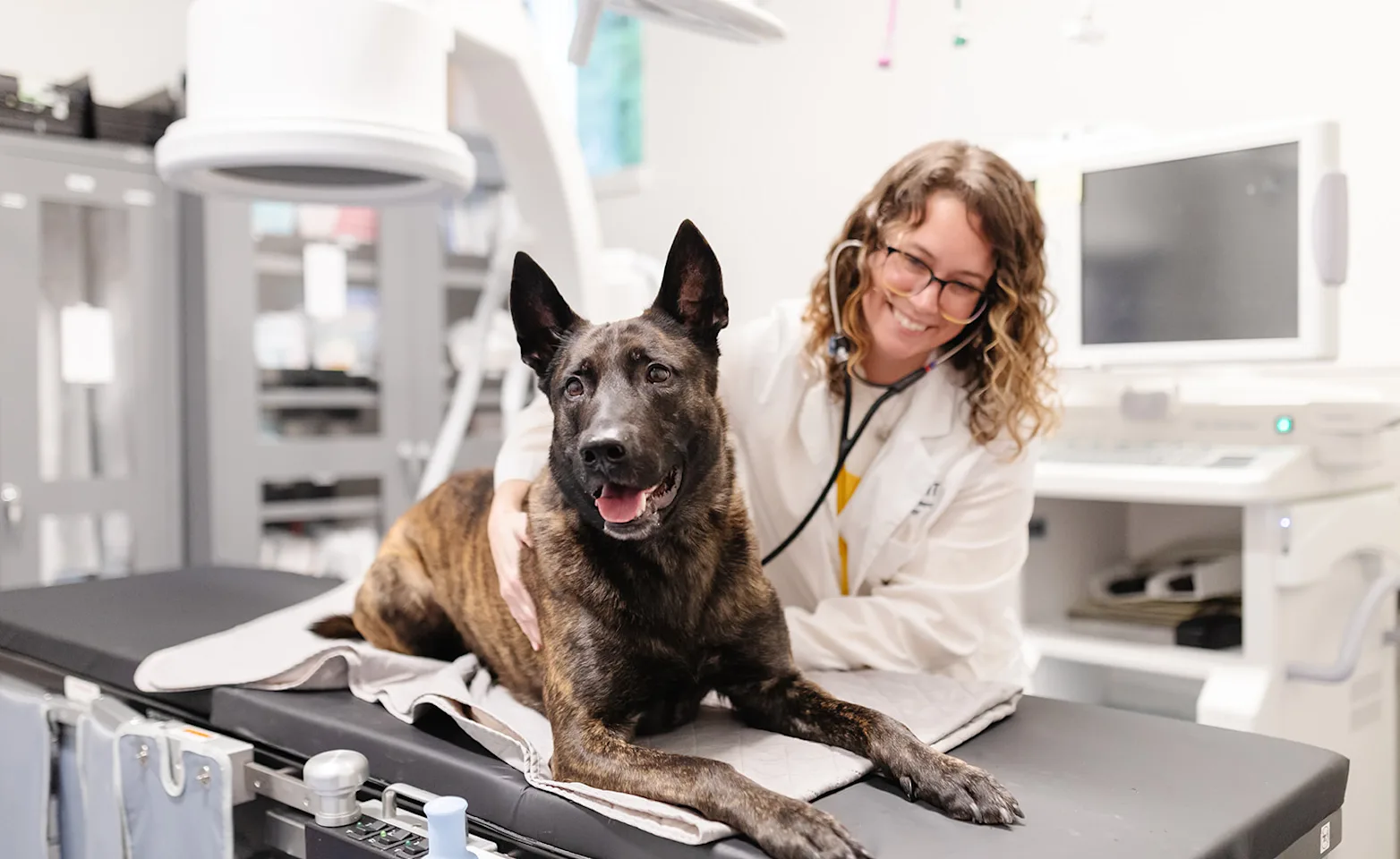Summit Veterinary Referral Center

The Cardiology department focuses on diagnosing, treating, and managing diseases of the cardiovascular system (heart and blood vessels). Our cardiologists are dedicated to providing treatment options for pets with cardiac conditions with the aim of maintaining comfort and quality of life for as long as possible.
Common cardiovascular conditions in dogs and cats include:
Structural abnormalities affecting the heart muscle or valves
Congenital (born with) abnormalities such as a patent ductus arteriosus (PDA), ventricular septal defect (VSD), pulmonic stenosis (PS) or subaortic stenosis (SAS)
Hypertension (high blood pressure) syndromes
Arrhythmias (disorders of the conduction system of the heart)
Heart failure
Diagnosis of cardiovascular disease often involves the use of specialized equipment to image the heart in motion, measure the chambers of the heart and its function, and map the electrical activity in the heart.
Diagnostic tests that may be recommended for your pet include:
Echocardiography (ultrasound of the heart)
Electrocardiography (analysis of electrical activity in the heart and heart rhythm)
Blood pressure measurement
Radiography

Minimally Invasive Interventional Cardiology
Our interventional cardiology team uses a minimally invasive approach to correcting congenital or acquired heart defects in dogs and cats. This allows us to avoid traditional "open" surgical approaches, which means much less pain and risk than traditional surgery.
In these procedures, we access the heart by driving special guidewires and catheters through peripheral blood vessels that lead to the heart, which allows for therapeutic interventions including devices to be implanted or narrowed heart valves to be dilated.
Real-time x-ray (fluoroscopy) aids in the visualization of the beating heart and catheter manipulation during these procedures. Additionally, non-invasive 3-dimensional transesophageal cardiac ultrasound is also frequently used to guide interventional therapies.
Common performed procedures:
Patent ductus arteriosus (PDA) occlusion
Balloon valvuloplasty for severely narrowed heart valves (e.g. pulmonic stenosis)
Pacemaker implantation
These minimally invasive cardiac procedures are performed by our board-certified cardiologists, working in tandem with a team of highly trained support staff as well as board-certified anesthesiologists. Please click here to learn more about what you can expect.
Initial Consultation
Your pets first Cardiology evaluation will include a comprehensive physical examination by the Cardiologist, and an echocardiogram (ultrasound of the heart). Additional diagnostics may be recommended/performed as deemed necessary by the Cardiologist.
Within the week prior to your Cardiology appointment, you will receive a confirmation with links to a Cardiology questionnaire. Please fill this out at least 48 hours before your scheduled appointment. This information will be verbally confirmed at the time of your appointment.
Please bring all medications your pet is taking to the appointment. Upon arrival, please check with the front desk, and then have a seat in our lobby. A team member will arrive shortly. The team member will review your pet's medical history, symptoms, and medications. You will also be provided with a verbal estimate for all diagnostics the Cardiologist will perform. Your pet will then be taken by the team member to the Cardiology diagnostic room. where your pet will receive a comprehensive evaluation by the Cardiologist, the necessary diagnostics will be performed. This step can take approximately 20-45 minutes. Once the evaluation and diagnostics are finished, the staff member will return your pet to you. The Cardiologist will then be reviewing the diagnostics, and establish a care plan. This can take 5-15 minutes depending on the complexity of your pet's cardiac health. Once complete, the Cardiologist will meet with you and your pet to review all findings and the care plan. "
If your pet requires a calming aid, please refer to the list below and provide a dose of the medication the night before your appointment as well as 2 hours prior to your appointment.
ACCEPTABLE CALMING AIDS:
Gabapentin
Trazodone
Over the counter calming aids (melatonin/CBD)
If you provide a calming aid to your pet with something other than what is listed, please reach out to us
Do not give acepromazine, Sileo, or any products containing these medications as they can greatly impact cardiac function.
If your pet requires additional sedation, we will utilize a cardiac safe medication, and only administer the minimum amount required to facilitate diagnostics. This is an additional cost.
Pre-operative Instructions
Preparing for the procedure
In general, no food should be given after midnight the night before a planned procedure although patients can continue to have free access to water. Medication administration before the procedure should be verified with the attending cardiologist.
Often an early morning drop-off time will be arranged by the cardiology team, which allows for proper preparation of your pet by the cardiology and anesthesia services. Our board-certified anesthesiologists tailors each anesthetic plan based on the individual patient to make the anesthetic procedure as safe as possible.
Pain management
Most of our interventional cardiology procedures cause minimal discomfort as there are no significant incisions, and these procedures are performed under general anesthesia. Our procedures are often performed with a small skin puncture to access the underlying vessel. Patients receiving minimally invasive pacemaker implants will have two small incisions, which are pre-emptively treated with a multimodal pain approach including both injectable and oral pain medications, as well as a long-acting numbing agent at the incision site (e.g. local anesthetic).
Duration of hospitalization
Most of our patients stay overnight in the hospital for close monitoring following the procedure, and generally patients are discharged the following day. Detailed post-operative instructions will be discussed during the discharge appointment.
Post-operative recovery
This depends on the procedure being performed, though most patients will have at least two weeks of exercise restriction. No running, jumping, or playing is allowed during this time frame. Patients should be supervised with leashed short walks for bathroom breaks. Often sedative medications are dispensed at discharge to help post-operative patients stay calm during the recovery period.
Long-term follow-up
Our interventional patients do require follow-up, and the extent of this depends on the procedure performed. Most patients are evaluated by a cardiologist 1-2 months post-procedure. We work closely with our primary care veterinarians as well as our referring cardiologist colleagues to keep them informed along the way, and we strive to send patients back to their local cardiology care team whenever possible.

